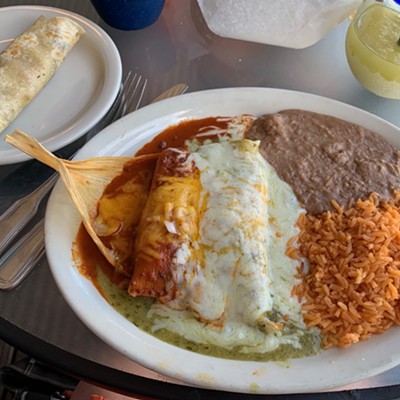I was prepared to dislike Chubster the moment it landed on my desk. A hipster's guide to losing weight? While staying cool? Oh, fer Christ's sake. Hipsters -- like bacon -- are everywhere these days.
Diet books are everywhere these days, too. 'Tis the season for New Year's resolutions and fatties everywhere to attempt to lose some of those holiday pounds we put on watching old Firefly episodes with a leftover, spiral-sliced honey-glazed ham for company.
I get a lot of diet and weight-loss books across my desk this time of year for these reasons, like The Drunk Diet: How I Lost 40 Pounds...Wasted, written by Lady Gaga's boyfriend. (I cannot make this up.) I read a few pages of it before passing it along to our resident Lady Gaga-and-whiskey connoisseur Craig Hlavaty, who's been scanning it in hopes of gleaning any stray Gaga tidbits to add to his collection.
But what struck me about both books was that neither want you to change who you are in order to get healthier and lose weight.
In Chubster, written by former Phoenix New Times music editor and unabashed hipster (although he hates that word) Martin Cizmar, he jokingly prods at his own kind -- the record store snobs, the Mac fanboys -- while admitting that it's okay to be who you are. And that the real secret to successful, long-term weight loss is taking that into account.
In other words, I am no more likely to become Susan Powter overnight than Cizmar was going to become Jack LaLanne. (For you young'uns who don't remember either Powter or LaLanne, hit up the Googles.)
Like Cizmar, I hate working out and I hate organized, team sports. And like Cizmar, I'm about as likely to spend time weighing my food or sprouting my own wheatgrass as I am likely to take up parkour. These things just aren't who we are. And where so many people fail at losing weight is trying to fit into other peoples' ideas of accepted fitness or health norms.
What Cizmar suggests throughout his book is nothing more than good, old-fashioned common sense, meted out with a lot of laughs and friendly nudges. He encourages you to take a hard look at yourself -- and why you've gained or can't lose weight -- at the same time as he scrutinizes himself. Reading the book feels like entering into a fitness pact with a friend, not at all like the miserable time I signed myself up for a personal trainer at Bally's who made me cry three times a week.
Cizmar is blunt about a lot of things in the book: namely, that you'll have to start counting calories, whether you like it or not. It's not fun, it's not always easy, but it's the only way to successfully figure out how much food you're cramming down your maw and how much exercise (or not) you'll need to decrease your mass. This is the exact same formula espoused by Weight Watchers, without all the fees.
He's also blunt in his distaste for these types of organizations, which he feels take advantage of people and further cripple them by teaching them to rely on a proprietary system instead of learning how to apply weight-loss skills to their real lives. Only then can someone make the necessary adaptations to live a healthy life without having to spend the rest of their years living off Jenny Craig meals.
And that's just the beginning: The book is endlessly useful in a variety of ways, from suggesting various exercise activities that don't involve treadmills to providing a guide to the best (and worst) frozen dinners and fast food options. There's even an ethnic foods section for those of us who maybe didn't realize that naan is so goddamned bad for you.
Cizmar isn't just writing off the cuff in Chubster, either. Using his own words of advice, he lost 100 pounds in eight months. And he didn't go to the gym once.
Follow Eating Our Words on Facebook and on Twitter @EatingOurWords





